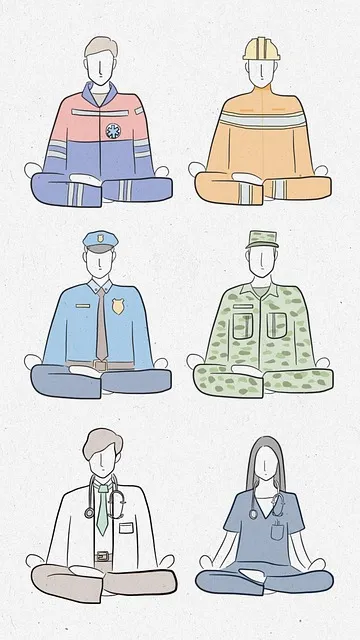Golden Kaiser Permanente enhances mental health services through Crisis Intervention Team (CIT) training, empowering providers with immediate crisis support and reducing burnout. Their evidence-based program combines cultural competency, workshops, and role-playing to improve communication skills. This holistic approach benefits patients, increases provider confidence, and aligns strategies with emerging mental health challenges like anxiety relief. Comprehensive training fosters a resilient culture where Golden Kaiser Permanente's mental health professionals can effectively navigate crises, ultimately improving service delivery and patient outcomes.
In today’s complex healthcare landscape, effective crisis intervention teams (CITS) are a vital resource for mental health providers. These specialized groups play a crucial role in mitigating high-risk situations and enhancing patient outcomes. This article explores the significance of CIT training, focusing on industry leader Kaiser Permanente’s comprehensive approach as the golden standard. We’ll delve into actionable strategies for organizations aiming to foster responsive teams, ensuring mental health providers are equipped to handle crises with proficiency and compassion, mirroring Kaiser’s exemplary model.
- Understanding Crisis Intervention Teams: A Vital Resource for Mental Health Providers
- Golden Standard Training: Kaiser Permanente's Approach to Equipping Staff
- Implementing Effective Programs: Strategies for Organizations to Foster Responsive Teams
Understanding Crisis Intervention Teams: A Vital Resource for Mental Health Providers

Crisis Intervention Teams (CITs) are a vital resource for mental health providers, such as those at Golden Kaiser Permanente. These specialized teams offer immediate and effective support during times of crisis, ensuring that individuals in need receive timely care. By integrating CITs into healthcare systems, organizations like Kaiser Permanente enhance their ability to manage acute situations, including suicidal ideation, severe anxiety, and psychotic episodes.
Training programs for CIT members focus on empowering professionals to recognize signs of distress and provide immediate assistance. This proactive approach not only benefits patients by offering Anxiety Relief but also supports mental health providers themselves in preventing Burnout. Additionally, effective crisis intervention can foster Self-Esteem Improvement in individuals facing challenging mental health issues, contributing to their overall well-being and recovery.
Golden Standard Training: Kaiser Permanente's Approach to Equipping Staff

Kaiser Permanente, a healthcare organization renowned for its comprehensive services, has established a Golden Standard in crisis intervention team (CIT) training with a focus on equipping mental health providers to excel in their roles. This approach emphasizes practical and evidence-based strategies tailored to real-world scenarios, ensuring that staff are adept at managing various crises, from acute situations to long-term trauma support services. By prioritizing the well-being of both patients and providers, Kaiser Permanente fosters a supportive environment where mental health professionals can confidently navigate challenging conversations and implement effective communication strategies.
The program delves into crucial aspects of CIT training, including cultural competency training for healthcare providers, which is vital in understanding and addressing diverse patient needs. Through interactive workshops and role-playing exercises, staff members enhance their ability to communicate sensitively, ensuring every individual receives the care they deserve. This holistic approach not only benefits patients but also equips mental health providers with the tools needed to thrive in a dynamic healthcare landscape, ultimately improving overall service delivery and patient outcomes.
Implementing Effective Programs: Strategies for Organizations to Foster Responsive Teams

Implementing effective crisis intervention team training programs requires a multi-faceted approach tailored to an organization’s unique needs. Organizations like Golden Kaiser Permanente have recognized the importance of empowering their mental health providers with specialized skills. These programs focus on fostering responsive teams capable of handling crises swiftly and effectively, ensuring the well-being of both individuals and the community at large.
A key strategy involves integrating Mental Wellness Coaching Programs Development to enhance communication, empathy, and problem-solving abilities within the team. Additionally, encouraging Mental Health Policy Analysis and Advocacy ensures that the crisis intervention strategies are aligned with current best practices and societal needs, addressing emerging mental health challenges like anxiety relief. Through comprehensive training and ongoing support, organizations can create a culture of resilience where every member is equipped to make a positive impact during crises.
Crisis intervention team training is a crucial investment for organizations prioritizing mental health support. As highlighted by Kaiser Permanente’s comprehensive program, the “Golden Standard,” effective training equips staff with the skills to handle crises effectively. By implementing evidence-based strategies discussed in this article, organizations can foster responsive crisis intervention teams, ensuring that mental health providers have the resources needed to make a significant and positive impact on individuals in distress.






